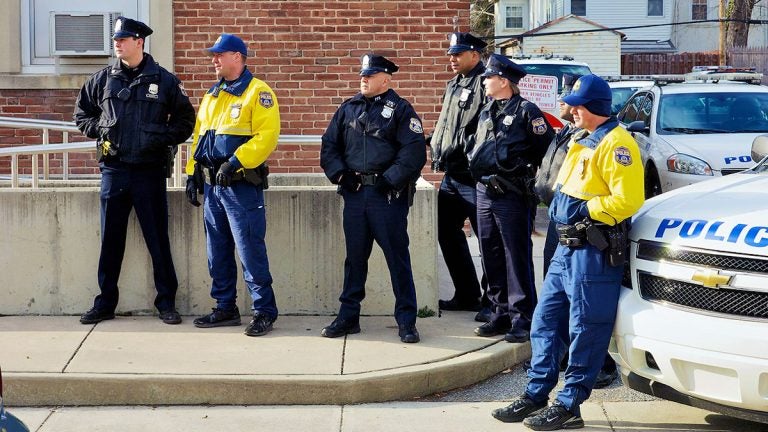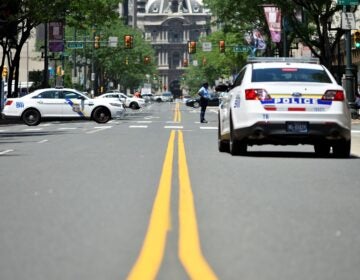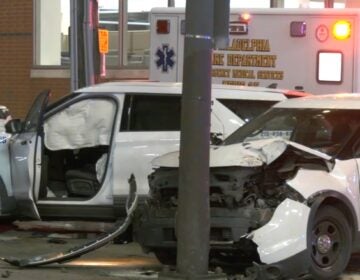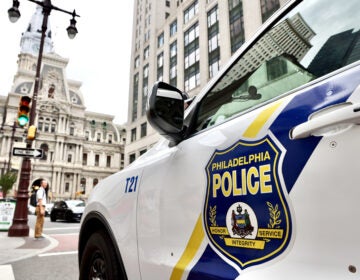Community Policing 101: A safer neighborhood requires neighbor involvement
The foundation of community policing rests upon three building blocks: community leaders, community participation, and governmental agencies.

Officers stand near the 14th district police station on Haines Street in Philadelphia. (Bas Slabbers/for NewsWorks, file)
Speak Easy presents a public discussion about strengthening the relationship between the police and the communities they serve. Seeking diverse perspectives, NewsWorks is hosting a public forum, “Police and Community Cooperation,” on Nov. 17 at WHYY studios. Registration is free at whyy.org/speakeasy.
—
The foundation of community policing rests upon three building blocks: community leaders, community participation and governmental agencies. Community policing cannot be successful without these three components working in partnership.
My involvement in community policing began in 2011 as a result of criminal activity taking place in the driveway that runs in the rear of our block. Prostitution and drug use were rampant there, and the many children on our block did not feel safe while playing in the rear of our homes. While calling 911 resulted in police response, the officers were often too late to catch the offenders, and that was not good enough.
Building a partnership
I reached out to our state representative, Cherelle Parker. She asked me to document each incident and each 911 call, and to forward that data to her office. I did, and her office communicated with the 14th District police captain.
Later that summer, Rep. Parker held an on-street community meeting to discuss our issue and problems on neighboring streets. That’s where I met the 14th District community relations officer and the director of Town Watch Integrated Services. I began attending monthly captain’s and Police Service Area (PSA) meetings at the 14th District. These meetings, which take place at police districts across the city, provide a forum for sharing crime and quality-of-life issues. My partnership with our state representative, the Philadelphia Police Department, and Town Watch Integrated Services was forged during those meetings.
A network of neighbors
I decided to create a town watch in our community. I recruited trainees who live on three blocks, including our own. We have 13 members strategically located to be our eyes and ears.
I knew it would take more than watching for crime, however. It would take forming relationships among neighbors. In 2013, our block participated in the Philadelphia More Beautiful Committee‘s Beautiful Block Contest. The contest formalized my role as block captain and gave us a common goal to reach: the beautification of our block. We had 100% participation. Although we did not win, the experience laid the groundwork for setting goals.
We created a survey to determine interest in future projects. The group agreed to pay dues to finance the projects, which included purchasing a snow blower, purchasing seasonal flowers, and hosting a block party. We put in place a finance team for money management, became an IRS-designated homeowners’ association, and opened a bank account. All of the goals were achieved. This legitimized my role as a block leader. But leadership requires participation and inclusion. My leadership style is democratic. The neighbors set the agenda and I oversee its completion. Our current project is to acquire security cameras.
Our block now functions like a well-oiled machine. We have a telephone directory and an email group. We can communicate instantaneously. Group projects have enabled us to get to know one another, which is important in policing our block. We are aware of our neighbors’ daily patterns, and we know when something is out of the ordinary. Our neighbors notify me when something is amiss. We contact 911 and let law enforcement handle the situation. I in turn email our district police captain, lieutenant and state representative as a follow up. They promptly reply.
Public safety depends on public commitment
My community policing activities are not limited to my role as block captain and town watch leader. I also volunteer for the Police District Advisory Council.
In partnership with PDAC, I initiated an elementary school assembly and beautification project to celebrate Earth Day. The 14th District PDAC, along with 14th District Captain Sekou Kinebrew, community relations Officer Dennis Smith, crime prevention Officer Sharrod Davis and 14th District police clergy President Frank Crangle, visited Pennypacker Elementary School. Police and students talked, played games, and worked together to plant a tree and flowers, which had a positive impact on 300 children.
I never set out to formally become involved in community policing. I am just one individual who cares and realizes that I cannot do it alone. It requires a commitment from all individuals and government agencies in order for it to be successful.
—
LaVeta Jones is a community outreach event coordinator and freelance media producer. She has coordinated events with the School District of Philadelphia and elected officials including Councilwoman Cindy Bass. She also works extensively with the faith-based community and the Philadelphia Police Department. Her media experience includes production at 48 Hours/CBS News, Disney/Touchstone Pictures and Banyan Productions. LaVeta has also penned a family humor advice column, The Opinionated Housewife.
WHYY is your source for fact-based, in-depth journalism and information. As a nonprofit organization, we rely on financial support from readers like you. Please give today.





